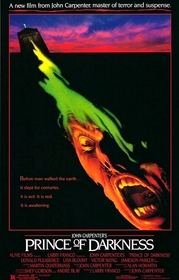Our editor-in-chief Nate Yapp is proud to have contributed to the new book Hidden Horror: A Celebration of 101 Underrated and Overlooked Fright Flicks, edited by Aaron Christensen. Another contributors include Anthony Timpone, B.J. Colangelo, Dave Alexander, Classic-Horror.com's own Robert C. Ring and John W. Bowen. Pick up a copy today from Amazon.com!
Prince of Darkness (1987)
There's something to admire about film makers that attempt something grand. John Carpenter, master craftsman behind The Thing and Halloween, would seem an ideal choice to create a film that treats God and the Anti-Christ with a scientific eye in the midst of a slow boil supernatural and intellectual horror thriller. What evolves out of this effort is something that is partially scientific and partially a horror film, but these parts do not gel together into a satisfying end product.
Prince of Darkness details the efforts of a Catholic priest (Donald Pleasence) and a professor (Victor Wong), along with a smattering of post-grad students, to analyze a mysterious canister of liquid in a church. In true John Carpenter tradition, they all end up besieged by an army of possessed homeless people (led by Alice Cooper, of all people), the heroes become bodily and mentally corrupted from within, dropping one by one, and it all ends with an ambiguous flourish of 'maybe it isn't over!'.
John Carpenter's greatest films specialize in strongly delivering simple concepts. Prince of Darkness instead attempts to bring us evil in the terms of quantum physics. In its simplest terms, the movie is about the evil liquid Anti-Christ trying to take solid form so it can haul Satan into our world. But the way the film discusses the whole situation is never simple. We're given discussions of matter and anti-matter, and then told to apply these concepts to Christian theology, posing Satan not as an embodiment of evil, but actually the 'Anti-God'. The film goes even further, throwing out ideas such as Jesus being an alien. While there's potential behind exploring that idea, the film just doesn't spend enough time building up that mythology. It just throws out these ideas, alien Jesus and Anti-Gods, and fails to develop them to a satisfactory depth. It's disappointing specifically because these ideas have such great potential. We are let down not by the fact that the ideas are absurd, but that they are so shallowly presented. A scientific approach deserves depth and explanation, not simply labels and short statements.
This paper-thin mythology leads to a major problem of suspension of disbelief, which isn't helped by the mostly wooden acting of the cast. Even Misters Pleasence and Wong seem to barely be able to get through their lines with an ounce of feeling. The other actors struggle even more, seemingly unable to comprehend any more about the script than the audience. Worst of all, because their performances are stilted and wooden, the characters are utterly unsympathetic. Even Alice Cooper, who has always made a living off of being creepy, doesn't fit into the film. His failings are not in his performance, but in the fact that you go 'wait, that's Alice Cooper' whenever he's on screen. It takes you out of the action, out of the world constructed and it becomes more and more difficult to become empathetic with the characters and events.
The film does work, when it goes for the more tangible horror. The sequence where a woman crawls on top of another in bed, then proceed to vomit evil slime into her mouth, is disgusting and horrifying by its basic, visceral nature. When Calder bangs a chair up the stairs behind himself, singing Amazing Grace before he slits his own throat, it is the most harrowing moment of the film. The sheer amount of crawling bugs and other grisly elements also contribute to a sense of creepiness that does pervade a lot of the overall mood of the film. This mood only fails when its exposition falters and ruins the suspension of disbelief, as I said before.
If there's one moment that sticks out in my mind as the biggest failing of Prince of Darkness, it's the 'creepy possessed lady types messages from evil' scene. The horror is supposed to come from the idea of this seemingly catatonic woman, her fingers furiously typing at a computer keyboard, repeating the words 'I Live!' over and over. When observed, suddenly she starts typing different messages, attempting to strike fear into the hearts of these poor grad students (and the audience). "You will not be saved by the Holy Ghost. You will not be saved by the god Plutonium. In fact, YOU WILL NOT BE SAVED." The first two lines are perfectly acceptable. It's the third line that just makes the whole thing fall down. The 'In fact' makes the evil sound like an egomaniacal comic book villain. 'In fact', this makes the Anti-Christ sound like an uptight dweeb, not some overwhelming evil from before the dawn of man. Again, a factor that ruins the suspension of disbelief and draws you out of the film instead of in.
One thing the film has consistently going for it is Carpenter's score. The man has always known how to write excellent mood setting music, and this film is no exception. When you see things such as the mysterious canister in the church for the first time, or the hordes of possessed homeless gathering outside, Carpenter knows just the write tones and harmonies to accentuate the visuals. It does its job, and does it well. Other things just end up getting in the way.
But above all, the biggest problem with Prince of Darkness is the pace. It is deliberately slow, attempting to build its horror slowly, with individual incidents peppering the plot up until the dramatic finale. The pace, however, is simply so slow the film stagnates. When all we have to occupy most of our time is the flimsy science discussed between poorly fleshed out characters, we begin to notice these problems more and more as time goes on. We grow bored, and then we grow annoyed.
We can't fault Carpenter for trying. If anything, this film is a case of a creative man biting off more than he can chew. He tries to pull elements from his earlier films, hoping that his old successes would replicate in his new movie. Sadly, the similarities just make us think of these earlier, scarier, and far more entertaining films. Prince of Darkness makes the dual mistakes of lingering without substance and moving slowly with substandard elements. A sad and rare fumble in Carpenter's filmography, Prince of Darkness tries hard, but does not accomplish enough.









Great review and awesome
Great review and awesome site. Have you noticed an ongoing theme in many of John carpenters films where the climax involves a world-changing or apocalyptic event? This can be seen in Escape From L.A., In the Mouth of Madness, and Prince of Darkness, to name a few. I always like that type of narrative jolt, it makes the film resonate in your mind long after its over. Id like it if you wrote a feature or article about it.
Generally speaking, I found
Generally speaking, I found this movie far more enthralling that the reviewer did. I felt casting Jameson Parker in the lead was a mistake. An early scene, in which the female lead literally apologizes for not succumbing to Parker's pathetic attempt at a pick-up line, was a turn-off, a failure of the script. And the reviwer is right about Cooper. Fine performance, but an unknown would have worked better.
I like to watch this movie directly after seeing Carpenter's more comedic "Big Trouble in Little China." Not only does Carpenter use many of the same actors, but his music, especially the bass notes, is very similar. I feel that with these two movies, he was presenting different ways of using very similar elements.
With regard to your comment
With regard to your comment about the passage in the movie:
When observed, suddenly she starts typing different messages, attempting to strike fear into the hearts of these poor grad students (and the audience). "You will not be saved by the Holy Ghost. You will not be saved by the god Plutonium. In fact, YOU WILL NOT BE SAVED." The first two lines are perfectly acceptable. It's the third line that just makes the whole thing fall down. The 'In fact' makes the evil sound like an egomaniacal comic book villain. 'In fact', this makes the Anti-Christ sound like an uptight dweeb, not some overwhelming evil from before the dawn of man.
This is a riff on a passage from Stephen Vinecnt Benet's poem "Nighrtmare, wioth Angels"
How long, O Lord God in the highest? How long, what now, perturbed spirit?"
He turned blue at the wingtips and disappeared as another angel
approached me.
This one was quietly but appropriately dressed in cellophane, synthetic
rubber and stainless steel,
But his mask was the blind mask of Ares, snouted for gasmasks.
He was neither soldier, sailor, farmer, dictator, nor munitions-manufacturer.
Nor did he have much conversation, except to say,
"You will not be saved by General Motors or the prefabricated house.
You will not be saved by dialectic materialism or the Lambeth Conference.
You will not be saved by Vitamin D or the expanding universe.
In Fact, you will not be saved."
In his hand was a woven, wire basket, full of seeds, small metallic and
shining like the seeds of portulaca;
Where he sowed them, the green vine withered, and the smoke and
armies sprang up.
Of course Benet's is better, the movie's lines are a bastardization, an amplification, and unnecessary to make the point (and too truncated to boot), but the issue of "In fact" I think, should be reassessed within the context of the orignal poem.
What do you think?
Cheers.